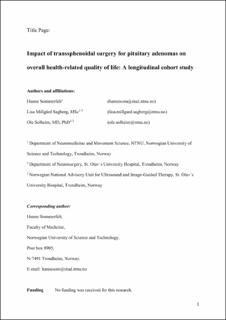| dc.contributor.author | Sommerfelt, Hanne | |
| dc.contributor.author | Sagberg, Lisa Millgård | |
| dc.contributor.author | Solheim, Ole | |
| dc.date.accessioned | 2021-06-11T10:46:32Z | |
| dc.date.available | 2021-06-11T10:46:32Z | |
| dc.date.created | 2019-09-25T13:50:17Z | |
| dc.date.issued | 2019 | |
| dc.identifier.issn | 0268-8697 | |
| dc.identifier.uri | https://hdl.handle.net/11250/2758963 | |
| dc.description.abstract | Background: Previous studies show a moderate improvement in health-related quality of life (HRQoL) following transsphenoidal surgery for pituitary adenomas, but no consistent predictors of HRQoL outcome have been identified. We aimed to evaluate overall HRQoL changes following such surgery, and assess potential patient or tumour characteristics that predict HRQoL outcome.
Materials and methods: Sixty adult patients undergoing transsphenoidal resection of pituitary adenomas were prospectively enrolled. They completed the EQ-5D 3L, a generic HRQoL questionnaire, preoperatively, and at one (n = 57) and six months (n = 56) postoperatively. HRQoL was assessed as both postoperative change in median EQ-5D 3L score, and as change greater than the minimal clinically important difference (MCID) in EQ-5D 3L score. A multivariable logistic regression analysis was performed to assess potential predictors of clinically significant HRQoL changes (>MCID) at six months postoperatively.
Results: There was a slight, but statistically significant, improvement in median EQ-5D 3L scores at six months postoperatively compared to preoperatively. Sixteen patients (29%) reported a clinically significant improvement in HRQoL at six months postoperatively, and larger preoperative tumour volume was a statistically significant predictor of such improvement. Eight patients (14%) reported a clinically significant deterioration in HRQoL at six months, but none of the assessed variables predicted such deterioration.
Conclusions: Patient-reported overall HRQoL improved slightly after transsphenoidal surgery for pituitary adenomas at group level. Patients with larger tumours might have more HRQoL benefits from surgery, but the mechanisms behind the predictive nature of tumour volume remain unknown. | en_US |
| dc.language.iso | eng | en_US |
| dc.publisher | Taylor & Francis | en_US |
| dc.rights | Attribution-NonCommercial-NoDerivatives 4.0 Internasjonal | * |
| dc.rights.uri | http://creativecommons.org/licenses/by-nc-nd/4.0/deed.no | * |
| dc.title | Impact of transsphenoidal surgery for pituitary adenomas on overall health-related quality of life: a longitudinal cohort study | en_US |
| dc.type | Peer reviewed | en_US |
| dc.type | Journal article | en_US |
| dc.description.version | acceptedVersion | en_US |
| dc.source.journal | British Journal of Neurosurgery | en_US |
| dc.identifier.doi | 10.1080/02688697.2019.1667480 | |
| dc.identifier.cristin | 1728932 | |
| dc.description.localcode | This is an Accepted Manuscript of an article published by Taylor & Francis, available at http://dx.doi.org/10.1080/02688697.2019.1667480 | en_US |
| cristin.ispublished | true | |
| cristin.fulltext | preprint | |
| cristin.qualitycode | 1 | |

